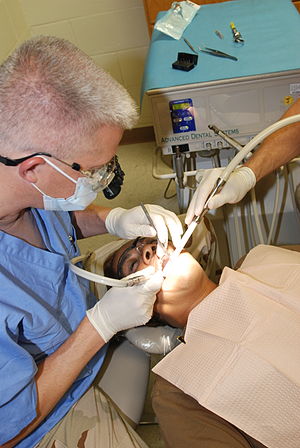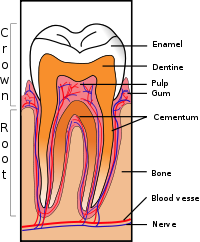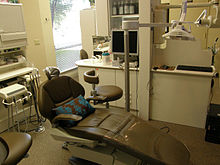- Dentistry
-
This article is about dental science. For the profession see Dentist. For tooth care see oral hygiene and dental surgery.
Dentist Occupation Activity sectors Medicine Description Education required Dental degree Dentistry is the branch of medicine that is involved in the study, diagnosis, prevention, and treatment of diseases, disorders and conditions of the oral cavity, maxillofacial area and the adjacent and associated structures and their impact on the human body.[1] Dentistry is widely considered necessary for complete overall health. Doctors who practice dentistry are known as dentists. The dentist's supporting team – which includes dental assistants, dental hygienists, dental technicians, and dental therapists – aids in providing oral health services.
Contents
Overview
Dental surgery and treatments
Dentistry usually encompasses very important practices related to the oral cavity. Oral diseases are major public health problems due to their high incidence and prevalence across the globe with the disadvantaged affected more than other socio-economic groups.[2]
The majority of dental treatments are carried out to prevent or treat the two most common oral diseases which are dental caries (tooth decay) and periodontal disease (gum disease or pyorrhea). Common treatments involve the restoration of teeth as a treatment for dental caries (fillings), extraction or surgical removal of teeth which cannot be restored, scaling of teeth to treat periodontal problems and endodontic root canal treatment to treat abscessed teeth.
All dentists in the United States undergo four years of undergraduate studies, followed by four years of dental school to qualify as a "Doctor of Dental Surgery" (DDS) or "Doctor of Dental Medicine" (DMD). Dentists need to complete additional qualifications or training to carry out more complex treatments such as sedation, oral and maxillofacial surgery, and dental implants.
By nature of their general training they can carry out the majority of dental treatments such as restorative (fillings, crowns, bridges), prosthetic (dentures), endodontic (root canal) therapy, periodontal (gum) therapy, and exodontia (extraction of teeth), as well as performing examinations, radiographs (x-rays) and diagnosis. Dentists can also prescribe medications such as antibiotics, sedatives, and any other drugs used to manage the patient.
Prevention
Dentists also encourage prevention of oral diseases through proper hygiene and regular checkups. Conditions in the oral cavity may be indicative of systemic diseases such as osteoporosis, diabetes, or cancer. Multiple studies have also shown that gum disease is associated with an increased risk of diabetes, heart disease, and preterm birth
Education and licensing
The first dental school, Baltimore College of Dental Surgery, opened in Baltimore, Maryland, USA in 1840. Philadelphia Dental College was founded in 1863 and is the second in the United States. In 1907 Temple University accepted a bid to incorporate the school.
Studies showed that dentists graduated from different countries,[3] or even from different dental schools in one country,[4] may have different clinical decisions for the same clinical condition. For example, dentists graduated from Israeli dental schools may recommend more often for the removal of asymptomatic impacted third molar (wisdom teeth) than dentists graduated from Latin American or Eastern European dental schools.[5]
In the United Kingdom, the 1878 British Dentists Act and 1879 Dentists Register limited the title of "dentist" and "dental surgeon" to qualified and registered practitioners.[6][7] However, others could legally describe themselves as "dental experts" or "dental consultants".[8] The practice of dentistry in the United Kingdom became fully regulated with the 1921 Dentists Act, which required the registration of anyone practicing dentistry.[9] The British Dental Association, formed in 1880 with Sir John Tomes as president, played a major role in prosecuting dentists practising illegally.[6]
Universities that offer dental education in the UK are sparse, with just seven colleges. Thus the competition for places can be fierce[10]. Because of the low numbers of dental schools, funding for building and service developments in the schools can be very high. Well known in the media and amongst the most well-funded of these is the University of Manchester, who have ascertained multi-million pounds backings to maintain and elevate their standing as the preferred choice for dental education in the UK.[11] Other well known UK universities also providing the dental course are the Universities of Bristol, Sheffield, Queen's Belfast and Liverpool.
In Korea, Taiwan, Japan, Finland, Sweden, Germany, the United States, and Canada, a dentist is a healthcare professional qualified to practice dentistry after graduating with a degree of either Doctor of Dental Surgery (DDS) or Doctor of Dental Medicine (DMD). This is equivalent to the Bachelor of Dental Surgery/Baccalaureus Dentalis Chirurgiae (BDS, BDent, BChD, BDSc) that is awarded in the UK and British Commonwealth countries. In most western countries, to become a qualified dentist one must usually complete at least four years of postgraduate study[citation needed]; within the European Union the education has to be at least five years. Dentists usually complete between five and eight years of post-secondary education before practising. Though not mandatory, many dentists choose to complete an internship or residency focusing on specific aspects of dental care after they have received their dental degree.
Specialties
The American Dental Association recognizes nine dental specialties: Public Health Dentistry, Endodontics, Oral & Maxillofacial Pathology, Oral & Maxillofacial Radiology, Oral & Maxillofacial Surgery (Oral Surgeon), Orthodontics, Pediatric Dentistry, Periodontics, Prosthodontics, and General Dentistry.[12][13]
History
The Indus Valley Civilization has yielded evidence of dentistry being practiced as far back as 7000 BC.[14] This earliest form of dentistry involved curing tooth related disorders with bow drills operated, perhaps, by skilled bead craftsmen.[15] The reconstruction of this ancient form of dentistry showed that the methods used were reliable and effective.[16]
A Sumerian text from 5000 BC describes a "tooth worm" as the cause of dental caries.[17] Evidence of this belief has also been found in ancient India, Egypt, Japan, and China. The legend of the worm is also found in the writings of Homer, and as late as the 14th century AD the surgeon Guy de Chauliac still promoted the belief that worms cause tooth decay.[18]
The Edwin Smith Papyrus, written in the 17th century BC but which may reflect previous manuscripts from as early as 3000 BC, includes the treatment of several dental ailments.[19][20] In the 18th century BC, the Code of Hammurabi referenced dental extraction twice as it related to punishment.[21] Examination of the remains of some ancient Egyptians and Greco-Romans reveals early attempts at dental prosthetics and surgery.[22]
Ancient Greek scholars Hippocrates and Aristotle wrote about dentistry, including the eruption pattern of teeth, treating decayed teeth and gum disease, extracting teeth with forceps, and using wires to stabilize loose teeth and fractured jaws.[23] Some say the first use of dental appliances or bridges comes from the Etruscans from as early as 700 BC.[24] Further research suggested that 3000 B.C. In ancient Egypt, Hesi-Re is the first named “dentist” (greatest of the teeth). The Egyptians bind replacement teeth together with gold wire. Roman medical writer Cornelius Celsus wrote extensively of oral diseases as well as dental treatments such as narcotic-containing emollients and astringents.[25][26]
Historically, dental extractions have been used to treat a variety of illnesses. During the Middle Ages and throughout the 19th century, dentistry was not a profession in itself, and often dental procedures were performed by barbers or general physicians. Barbers usually limited their practice to extracting teeth which alleviated pain and associated chronic tooth infection. Instruments used for dental extractions date back several centuries. In the 14th century, Guy de Chauliac invented the dental pelican[27] (resembling a pelican's beak) which was used up until the late 18th century. The pelican was replaced by the dental key[27] which, in turn, was replaced by modern forceps in the 20th century.[citation needed]
The first book focused solely on dentistry was the "Artzney Buchlein" in 1530,[28] and the first dental textbook written in English was called "Operator for the Teeth" by Charles Allen in 1685.[7] It was between 1650 and 1800 that the science of modern dentistry developed. The English physician Thomas Browne in his A Letter to a Friend (pub. post. 1690) made an early dental observation with characteristic humour –
The Egyptian Mummies that I have seen, have had their Mouths open, and somewhat gaping, which affordeth a good opportunity to view and observe their Teeth, wherein 'tis not easie to find any wanting or decayed: and therefore in Egypt, where one Man practised but one Operation, or the Diseases but of single Parts, it must needs be a barren Profession to confine unto that of drawing of Teeth, and little better than to have been Tooth-drawer unto King Pyrrhus, who had but two in his Head.It is said that the 17th century French physician Pierre Fauchard started dentistry science as we know it today, and he has been named "the father of modern dentistry".[29] Among many of his developments were the extensive use of dental prosthesis, the introduction of dental fillings as a treatment for dental caries and the statement that sugar derivative acids such as tartaric acid are responsible for dental decay.
There has been a problem of quackery in the history of dentistry, and accusations of quackery among some dental practitioners persist today.[30]
Priority patients
UK NHS priority patients include patients with congenital abnormalities (such as cleft palates and hypodontia), patients who have suffered orofacial trauma and those being treated for cancer in the head and neck region. These are treated in a multidisciplinary team approach with other hospital based dental specialities orthodontics and maxillofacial surgery. Other priority patients include those with infections (either third molars or necrotic teeth) or avulsed permanent teeth, as well as patients with a history of smoking or smokeless tobacco with ulcers in the oral cavity also.
Geography
Organizations
See also
Main articles: List of basic dentistry topics and Index of oral health and dental articles- Barodontalgia
- Biodontics
- Calculus
- Crown
- Dental amalgam
- Dental brace
- Dental cavities
- Dental extraction
- Dental fear
- Dental implants
- Dental laboratory
- Dental notation
- Dental restoration
- Dentin
Lists
References
- ^ Dentistry Definitions, hosted on the American Dental Association website. Page accessed 30 May 2010. This definition was adopted the association's House of Delegates in 1997.
- ^ The World Oral Health Report 2003: continuous improvement of oral health in the 21st century – the approach of the WHO Global Oral Health Programme
- ^ Zadik Yehuda, Levin Liran (January 2008). "Clinical decision making in restorative dentistry, endodontics, and antibiotic prescription". J Dent Educ 72 (1): 81–6. PMID 18172239.
- ^ Zadik Yehuda, Levin Liran (April 2006). "Decision making of Hebrew University and Tel Aviv University Dental Schools graduates in every day dentistry—is there a difference?". J Isr Dent Assoc 23 (2): 19–23. PMID 16886872.
- ^ Zadik Yehuda, Levin Liran (April 2007). "Decision making of Israeli, East European, and South American dental school graduates in third molar surgery: is there a difference?". J Oral Maxillofac Surg 65 (4): 658–62. doi:10.1016/j.joms.2006.09.002. PMID 17368360. http://www.sciencedirect.com/science?_ob=ArticleURL&_udi=B6WKF-4N8JDW3-J&_user=10&_rdoc=1&_fmt=&_orig=search&_sort=d&view=c&_acct=C000050221&_version=1&_urlVersion=0&_userid=10&md5=734474d0fe654970b56c219106722fb6. Retrieved 2008-07-16.
- ^ a b Gelbier, Stanley. 125 Years of Developments in Dentistry. British Dental Journal (2005); 199, 470–473. Page accessed 11 December 2007. The 1879 register is referred to as the "Dental Register".
- ^ a b The story of dentistry: Dental History Timeline, hosted on the British Dental Association website. Page accessed 2 March 2010.
- ^ "Failure of Act". The Glasgow Herald. 8 February 1955. http://news.google.com/newspapers?nid=2507&dat=19550208&id=Ihc1AAAAIBAJ&sjid=9aULAAAAIBAJ&pg=2264,3628076. Retrieved 2 March 2010.
- ^ History of Dental Surgery in Edinburgh, hosted on the Royal College of Surgeons of Edinburgh website. Page accessed 11 December 2007.
- ^ Dentist Entry Requirements, hosted on Prospects website. Page accessed 30 October 2011
- ^ http://www.topuniversities.com/institution/university-manchester. Top Universities. Manchester University. Last Accessed 30 October 2011
- ^ "Dental Specialties". American Dental Association (ADA). http://www.ada.org/104.aspx. Retrieved 2010-12-24.
- ^ "Dental Specialties PreDDS.NET". PreDDS.NET. http://predds.net/dental-specialties. Retrieved 2010-12-24.
- ^ Coppa, A. et al. 2006. Early Neolithic tradition of dentistry. Nature. Volume 440. 6 April 2006.
- ^ BBC (2006). Stone age man used dentist drill.
- ^ MSNBC (2008). Dig uncovers ancient roots of dentistry.
- ^ History of Dentistry: Ancient Origins, hosted on the American Dental Association website. Page accessed 9 January 2007.
- ^ Suddick, Richard P. and Norman O. Harris. "Historical Perspectives of Oral Biology: A Series". Critical Reviews in Oral Biology and Medicine, 1(2), pages 135–151, 1990.
- ^ Arab, M. Sameh. Medicine in Ancient Egypt. Page accessed 15 December 2007.
- ^ Ancient Egyptian Dentistry, hosted on the University of Oklahoma website. Page accessed 15 December 2007.
- ^ Wilwerding, Terry. History of Dentistry, hosted on the Creighton University School of Dentistry website, page 4. Page accessed 15 December 2007.
- ^ "Medicine in Ancient Egypt 3". Arabworldbooks.com. http://www.arabworldbooks.com/articles8c.htm. Retrieved 2010-04-18.
- ^ History of Dentistry Ancient Origins[dead link]
- ^ "History of Dentistry Research Page, Newsletter". Rcpsg.ac.uk. http://www.rcpsg.ac.uk/hdrg/2006May8.htm. Retrieved 2010-04-18.
- ^ "Dentistry – Skill And Superstition". Science.jrank.org. http://science.jrank.org/pages/1995/Dentistry-Skill-superstition.html. Retrieved 2010-04-18.
- ^ "Dental Treatment in the Ancient Times". Dentaltreatment.org.uk. http://www.dentaltreatment.org.uk/history.html. Retrieved 2010-04-18.
- ^ a b "Antique Dental Instruments". Dmd.co.il. http://www.dmd.co.il/antiques. Retrieved 2010-04-18.
- ^ History of Dentistry Middle Ages[dead link]
- ^ History of Dentistry Articles[dead link]
- ^ Ring, Malvin E (1998). "Quackery in Dentistry – Past and Present". Journal of the California Dental Association. http://www.cda.org/library/cda_member/pubs/journal/jour1198/quackery.html. Retrieved 21 March 2009.
External links
- The American Academy of the History of Dentistry
- Information resource for UK dental professionals
- Dentistry at the Open Directory Project
Dental schools United States dental schools Alabama - Arizona - Arthur A. Dugoni (Pacific) - Baltimore - Baylor - Buffalo - Case - Colorado - Columbia - Connecticut - Creighton - Detoit Mercy - East Carolina - Florida - Georgia - Goldman (Boston) - Harvard - Howard - Illinois - Indiana - Iowa - Kentucky - Loma Linda - Louisiana - Marquette - Maurice H. Kornberg (Temple) - Meharry - Michigan - Minnesota - Mississippi - Missouri-Kansas - Nebraska - New Jersey - New York - Nova - Ohio - Oklahoma - Oregon - Penn - Pitt - Puerto Rico - South Carolina - Southern Illinois - Stony Brook - Tennessee - Texas (Houston) - Texas (San Antonio) - Tufts - UCLA - UCSF - UNC - UNLV - USC - Rochester - Washington - West Virginia - VCU Defunct United States dental schools Harris - Northwestern - Loyola - Wash U - Pennsylvania College - Georgetown - Farleigh Dickenson - Emory - Oral Roberts Canadian dental schools Dalhousie - McGill - Laval - Western Ontario - Alberta - British Columbia - Manitoba - Montréal - Saskatchewan - Toronto Australian and New Zealand dental schools Dentistry Recognized specialties
(in the United States)Endodontics - oral and maxillofacial pathology - Oral and maxillofacial radiology - Oral and maxillofacial surgery - Orthodontics and dentofacial orthopedics - Pediatric dentistry - Periodontics - Prosthodontics - Dental public healthFields that are not recognized specialties
(in the United States)Dental surgery Dental extraction - Tooth filling - Root canal therapy - Root end surgery - Scaling and root planing - Teeth cleaning -Dental bonding - Tooth polishing - Tooth bleaching - Dental implantSee also Index of oral health and dental articles - Outline of dentistry and oral health - Oral hygiene - Dental instruments - Restorative materials - Infant oral mutilationCategories:- Dentistry
- Military occupations
- Healthcare occupations
- Health sciences
Wikimedia Foundation. 2010.





